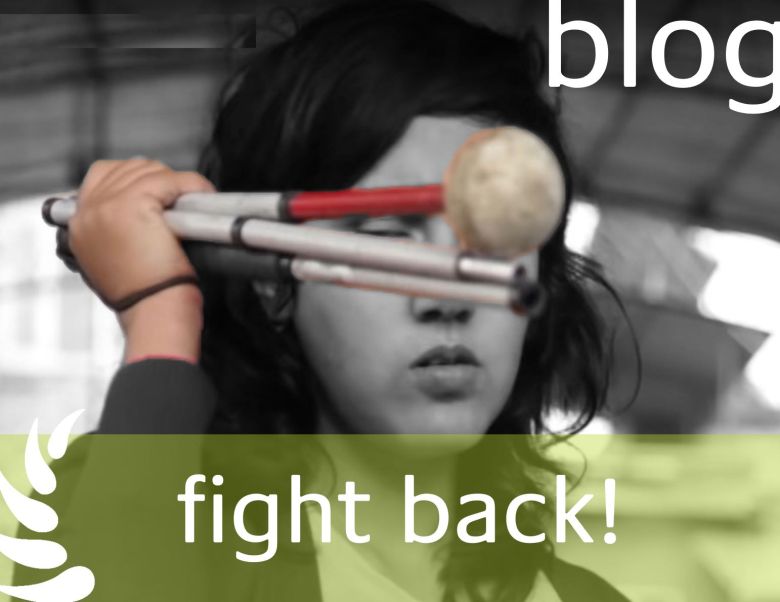Fight back
by Chacko Jacob – kanthari catalyst
A woman scrambles to get on a bus before it leaves; she barely makes it. Stumbling around to grab onto something while the bus bounces along a busy Kathmandu road, she suddenly senses a helping hand guiding her towards a grab handle. Her gratitude is short lived as it turns to disgust when the “helper” pushes himself up against her. “DON’T TOUCH ME LIKE THAT!”, she shouts. The man backs away in fear and embarrassment. His predatory behaviour towards someone he considered doubly weak (female and blind), and hence an easy target, will not stand this time.
This is the skit with which Sarita Lamichhane (2014 kanthari) decided to start her dream speech. Fiery, yet self-possessed, Sarita is passionate about fighting against the double discrimination of being a woman and being blind. With this skit she demonstrated what blind women in Nepal must go through daily.
Sarita grew up blind from birth in rural Nepal. Despite being enrolled in a residential inclusive school at the age of 6, her father was the one who taught her Braille, because the teachers at the school thought she was too young to learn. As she attended higher studies in Kathmandu, she came into contact with other blind women, and volunteered extensively with organizations working with the blind. She started to realize deficits in matters of policy, the attitude of the society, and the confidence in blind women.
Sarita was offered a secure government job at the same time that she got accepted into the kanthari leadership training programme. Her two options were:
Become integrated into the mainstream and achieve a modicum of “normalcy”, which is understandably what many people with disabilities desire.
Or stick out from the crowd, be fearless of failure, dream big and succeed. The choice was obvious to her, Sarita knew she wanted to be a change-maker and a leader.
I choose the word “leader” here very carefully. Going on google image search and entering the word “leader” gives you a multitude of similar images: a white male in a crisp suit towering above a crowd, his tie flying in the wind as he majestically points to a direction that everyone follows.
We are used to political leaders or CEOs of multi-national companies who have degrees from famous universities; they are products of mainstream thinking and wield their political and economic power to serve their interests and satiate their ambition and greed.
What about when standing up for the rights of a specific group of people becomes important or when protecting the environment counts more than money?
For these goals that really matter, we need a different type of leader, a leader from the margins. A leader who is not interested in power, wealth, or fame but someone who is intrinsically driven to create a better community, society, and world in which everyone counts. They are driven this way because they have personally faced and overcome injustice.
Like most kantharis, Sarita is a leader from the margins. During her time at kanthari, she realized that it wasn’t only society that needed to change their attitude towards blind women, but the blind women themselves needed motivation and confidence to face a patriarchal and non-inclusive society. She went on to found Prayatna Nepal to empower visually impaired girls and women to take charge of their own lives. Prayatna Nepal’s goal is to instill independence through training in daily living and interpersonal skills; employability through professional competence such as resumes and interviews; and strength through self-defense techniques to enable themselves to fight back.
The pandemic has been tough on visually impaired women in particular. Alcohol use among men working in the restaurant industry has increased drastically. Reports of abuse from drunken husbands led Prayatna Nepal to conduct virtual “fight back” training for 11 women. Prayatna Nepal stays on its toes to fill any gap that it senses in this community. This is evident through its many trainings in menstrual hygiene, feminist dialogue series, signature writing (“Say No To Fingerprint”), CV writing and interview techniques, mobility, sexuality and gender discussions, pitching, disaster risk management, rescue and relief operations (during the 25th April and May 12th 2015 earthquake) and a myriad of other activities.
When the motivator is not money or fame, but instead an intrinsic desire to create social change, you get emphatic leaders creatively solving problems that they once faced themselves, so that others can have what they have: dignity, inclusion, and the right to lead a meaningful life.
More info about Sarita’s work is available at http://www.prayatnanepal.org

